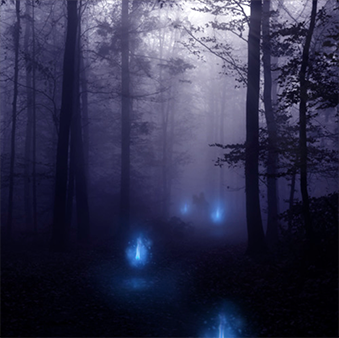Again.
It’s that kind of a week. I keep, purposely, diving down after the White Rabbit in an effort to feed my head. Feed my head. Feed my head.
Toward that end, the word for today is:
Will-o'-the-wisp
Noun
- Ignis Fatuus, (Latin ‘foolish fire), a light that sometimes appears in the night over marshy ground and is often attributable to the combustion of gas from decomposed organic matter.
- something deceptive or deluding.
In olden* days, it was personified as "Will with the wisp," a sprite who carried a fleeting "wisp" of light. Foolish travelers were said to try to follow the light and were then led astray into the marsh. (An 18th-century fairy tale described Will as one "who bears the wispy fire to trail the swains among the mire.") …Eventually, the name will-o’-the-wisp was extended to any impractical or unattainable goal. (source)
*olden days? What—ya mean, when I was just a sprout? That was, after all, 60 years ago. By olden could the author possibly mean centuries past? Olden days? Honestly, what the grey haired fuck?
In Denmark, Will-o’-the-Wisps are called Jack-o-Lanterns…They are said to be the spirits of unrighteous men, and the best way to guard against them is to turn one’s hat inside out. In the Netherlands, they are the souls of unbaptized children… In German legends, Will-o’-the-Wisps particularly like tormenting drunks on their way home from the bar…
In Argentina, the Luz Mala (evil light) is greatly feared. Traditionally, they believe that a white light represents a soul in trouble that needs a prayer. However, if the light is red, Satan is tempting the onlooker and it is recommended to flee immediately. In Bengal, Will-o’-the-Wisps are called Aleya, and are thought to be the souls of fishermen who died fishing and attempt to lure other fishermen to their deaths. In Mexico, they are the souls of witches. In Australia, the lights are called “min min lights” and follow people who see them. If the traveler follows the light instead, he will never be seen again. (source)
From the Middle Ages to the 1800s, "foolish fire" was a common image in art and literature, an object too of both superstitious dread and (remarkably inconclusive) rational investigation. Today, with wilds and wetlands vanishing and travelers safely cocooned in GPS-equipped autos, the Irrlicht (the German name) is rarely seen and rarely mentioned -- absorbed, perhaps, into the more glamourous UFO, which young J. Allen Hynek famously attempted to explain as "swamp gas". Harry Potter still contends with "hinkypunks" (a West Country expression saved from extinction by the magic of J. K. Rowling), but muggle science pays little attention to the ignis fatuus. (source)Feeding my bean with interesting words (their origins and evolution) is ever so much more calming than following the news. Yes, I’m still aware of what’s happening. I’m just letting other parts of the universe seep in so’s I’m not swimming in seas of rage while I rehab.
See, it’s all about the business of successful recovery. A much less complicated beast to wrangle when reading about fairy lights and planets.


Been awhile since I've responded to one of your posts, but the rabbit hole reference was interesting. I found this some time ago, and yeah I know you can't hear the music (White Rabbit by Gracie Slick), but it's a visual delight. I hope you enjoy it...
ReplyDeletehttps://www.youtube.com/watch?v=WnazKZyzZR0
WILD video! I can still hear the song inside my head—one of my favorites.
Delete